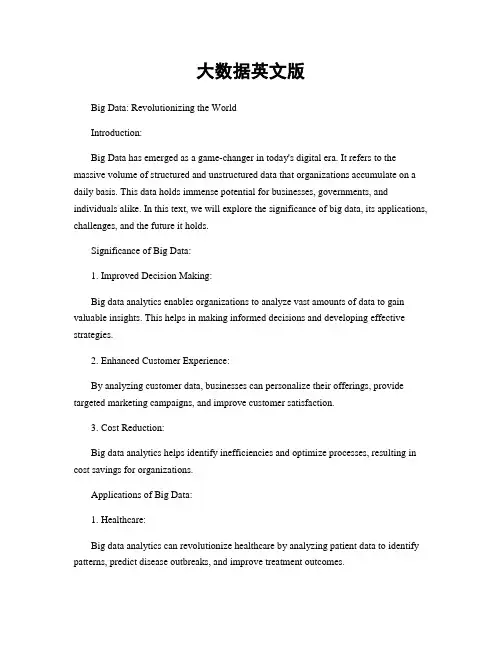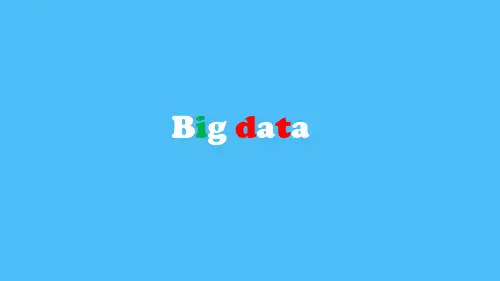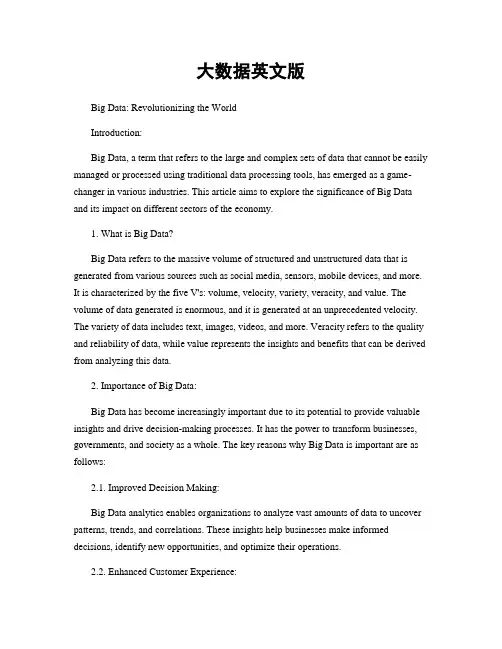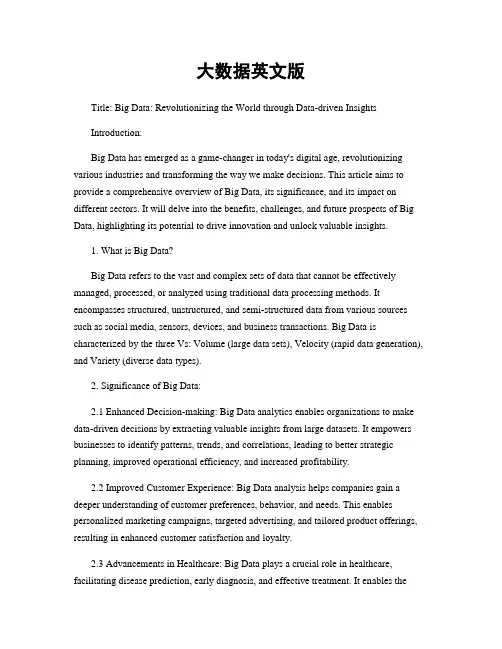BIG DATA 大数据 英文演讲ppt
- 格式:pptx
- 大小:131.77 MB
- 文档页数:44

大数据英文版Big Data: Revolutionizing the WorldIntroduction:Big Data has emerged as a game-changer in today's digital era. It refers to the massive volume of structured and unstructured data that organizations accumulate on a daily basis. This data holds immense potential for businesses, governments, and individuals alike. In this text, we will explore the significance of big data, its applications, challenges, and the future it holds.Significance of Big Data:1. Improved Decision Making:Big data analytics enables organizations to analyze vast amounts of data to gain valuable insights. This helps in making informed decisions and developing effective strategies.2. Enhanced Customer Experience:By analyzing customer data, businesses can personalize their offerings, provide targeted marketing campaigns, and improve customer satisfaction.3. Cost Reduction:Big data analytics helps identify inefficiencies and optimize processes, resulting in cost savings for organizations.Applications of Big Data:1. Healthcare:Big data analytics can revolutionize healthcare by analyzing patient data to identify patterns, predict disease outbreaks, and improve treatment outcomes.2. Retail:Big data enables retailers to analyze customer behavior, predict trends, optimize inventory, and offer personalized recommendations, enhancing the overall shopping experience.3. Finance:Financial institutions can use big data analytics to detect fraudulent activities, assess risks, and make real-time trading decisions.Challenges in Big Data:1. Data Privacy and Security:With the abundance of data, ensuring privacy and security is a major concern. Organizations must implement robust security measures to protect sensitive information.2. Data Quality:Big data often consists of unstructured and incomplete data. Ensuring data accuracy and quality is crucial for reliable analysis.3. Scalability:As the volume of data continues to grow exponentially, organizations face challenges in storing, processing, and analyzing this data efficiently.The Future of Big Data:1. Artificial Intelligence (AI) Integration:AI technologies, such as machine learning and natural language processing, will play a crucial role in analyzing big data and extracting valuable insights.2. Internet of Things (IoT):The increasing number of connected devices will generate massive amounts of data. Big data analytics will be essential in harnessing the potential of IoT.3. Predictive Analytics:Advancements in big data analytics will enable organizations to make accurate predictions, forecast trends, and take proactive measures.Conclusion:Big data has the potential to transform industries and revolutionize decision-making processes. Its applications in healthcare, retail, finance, and various other sectors are already evident. However, challenges related to data privacy, quality, and scalability must be addressed. With the integration of AI and IoT, and advancements in predictive analytics, big data will continue to shape the future and drive innovation in every aspect of our lives.。







大数据英文版Big Data: Revolutionizing the WorldIntroduction:Big Data, a term that refers to the large and complex sets of data that cannot be easily managed or processed using traditional data processing tools, has emerged as a game-changer in various industries. This article aims to explore the significance of Big Data and its impact on different sectors of the economy.1. What is Big Data?Big Data refers to the massive volume of structured and unstructured data that is generated from various sources such as social media, sensors, mobile devices, and more. It is characterized by the five V's: volume, velocity, variety, veracity, and value. The volume of data generated is enormous, and it is generated at an unprecedented velocity. The variety of data includes text, images, videos, and more. Veracity refers to the quality and reliability of data, while value represents the insights and benefits that can be derived from analyzing this data.2. Importance of Big Data:Big Data has become increasingly important due to its potential to provide valuable insights and drive decision-making processes. It has the power to transform businesses, governments, and society as a whole. The key reasons why Big Data is important are as follows:2.1. Improved Decision Making:Big Data analytics enables organizations to analyze vast amounts of data to uncover patterns, trends, and correlations. These insights help businesses make informed decisions, identify new opportunities, and optimize their operations.2.2. Enhanced Customer Experience:By analyzing customer data, organizations can gain a deeper understanding of their preferences, behavior, and needs. This allows them to personalize their offerings, improve customer service, and enhance overall customer experience.2.3. Cost Reduction and Efficiency:Big Data analytics can identify inefficiencies and areas of improvement within processes, leading to cost reductions and increased operational efficiency. For example, predictive maintenance can help prevent equipment failures, saving both time and money.2.4. Innovation and New Business Models:Big Data has the potential to drive innovation and the development of new business models. By analyzing data, organizations can identify emerging trends, market gaps, and untapped opportunities, leading to the creation of new products and services.3. Impact of Big Data on Different Sectors:Big Data has revolutionized various sectors, bringing about significant changes and improvements. Let's explore its impact on some key sectors:3.1. Healthcare:Big Data analytics has the potential to transform healthcare by improving patient outcomes, reducing costs, and enabling personalized medicine. By analyzing patient data, healthcare providers can identify patterns and predict diseases, leading to early diagnosis and timely interventions. Moreover, Big Data can help optimize healthcare operations, supply chain management, and resource allocation.3.2. Retail:Big Data analytics has revolutionized the retail industry by enabling personalized marketing, inventory optimization, and demand forecasting. By analyzing customer data, retailers can provide personalized recommendations, promotions, and offers, enhancing the customer experience. Additionally, Big Data analytics helps retailers optimize their inventory levels, reducing costs and minimizing stockouts.3.3. Finance:Big Data has transformed the finance industry by enabling better risk management, fraud detection, and customer insights. By analyzing financial data, banks and financial institutions can identify potential risks, detect fraudulent activities, and make informed lending decisions. Moreover, Big Data analytics helps financial institutions understand customer behavior, preferences, and needs, enabling them to provide personalized financial services.3.4. Transportation:Big Data analytics has revolutionized the transportation industry by improving efficiency, reducing congestion, and enhancing safety. By analyzing data from sensors, GPS devices, and traffic cameras, transportation companies can optimize routes, predict traffic patterns, and improve fleet management. Additionally, Big Data analytics enables the development of smart transportation systems, such as intelligent traffic lights and real-time public transportation updates.4. Challenges and Future Trends:While Big Data offers immense opportunities, it also presents several challenges. Some of the key challenges include data privacy and security, data quality, data integration, and talent shortage. Organizations need to address these challenges to fully leverage the potential of Big Data.Looking ahead, the future of Big Data seems promising. With the advancements in technology, such as artificial intelligence and machine learning, the capabilities of Big Data analytics will continue to expand. Moreover, the increasing adoption of Internet of Things (IoT) devices will generate even more data, further fueling the Big Data revolution.Conclusion:Big Data has become a driving force in today's digital era. Its ability to analyze large volumes of data and extract valuable insights has transformed various sectors, includinghealthcare, retail, finance, and transportation. By harnessing the power of Big Data, organizations can make informed decisions, enhance customer experiences, and drive innovation. However, addressing challenges such as data privacy and talent shortage is crucial to fully realize the potential of Big Data. As technology continues to evolve, the future of Big Data looks promising, opening up new possibilities for businesses and society as a whole.。


大数据英文版Title: Big Data: Revolutionizing the World through Data-driven InsightsIntroduction:Big Data has emerged as a game-changer in today's digital age, revolutionizing various industries and transforming the way we make decisions. This article aims to provide a comprehensive overview of Big Data, its significance, and its impact on different sectors. It will delve into the benefits, challenges, and future prospects of Big Data, highlighting its potential to drive innovation and unlock valuable insights.1. What is Big Data?Big Data refers to the vast and complex sets of data that cannot be effectively managed, processed, or analyzed using traditional data processing methods. It encompasses structured, unstructured, and semi-structured data from various sources such as social media, sensors, devices, and business transactions. Big Data is characterized by the three Vs: Volume (large data sets), Velocity (rapid data generation), and Variety (diverse data types).2. Significance of Big Data:2.1 Enhanced Decision-making: Big Data analytics enables organizations to make data-driven decisions by extracting valuable insights from large datasets. It empowers businesses to identify patterns, trends, and correlations, leading to better strategic planning, improved operational efficiency, and increased profitability.2.2 Improved Customer Experience: Big Data analysis helps companies gain a deeper understanding of customer preferences, behavior, and needs. This enables personalized marketing campaigns, targeted advertising, and tailored product offerings, resulting in enhanced customer satisfaction and loyalty.2.3 Advancements in Healthcare: Big Data plays a crucial role in healthcare, facilitating disease prediction, early diagnosis, and effective treatment. It enables theanalysis of large patient datasets, genomics, and clinical research, leading to improved patient outcomes, precision medicine, and public health management.2.4 Smart Cities and IoT: Big Data is instrumental in building smart cities by integrating data from various sources like sensors, devices, and social media. It enables efficient traffic management, energy optimization, waste management, and enhances the overall quality of urban life.3. Challenges in Big Data:3.1 Data Privacy and Security: With the increasing volume and variety of data, ensuring data privacy and security becomes a significant concern. Organizations need to implement robust security measures, comply with data protection regulations, and safeguard sensitive information from unauthorized access or breaches.3.2 Data Quality and Integration: Big Data often comes from diverse sources, making data quality and integration a challenge. Organizations need to ensure data accuracy, consistency, and reliability to derive meaningful insights and avoid erroneous decision-making.3.3 Scalability and Infrastructure: Managing massive datasets requires scalable infrastructure and storage solutions. Organizations need to invest in high-performance computing systems, cloud platforms, and data management tools to handle the velocity and volume of Big Data effectively.3.4 Skilled Workforce: The shortage of skilled professionals in Big Data analytics isa significant challenge. Organizations need data scientists, analysts, and engineers proficient in programming, statistics, machine learning, and data visualization to extract actionable insights from Big Data.4. Future Prospects of Big Data:4.1 Artificial Intelligence and Machine Learning: Big Data and AI are closely interconnected. The integration of AI and machine learning algorithms with Big Dataanalytics will lead to more accurate predictions, automation of tasks, and advanced decision-making capabilities.4.2 Predictive Analytics: Big Data analytics will continue to evolve, enabling organizations to predict future trends, customer behavior, and market dynamics. Predictive analytics will help businesses stay ahead of the competition, optimize operations, and identify new growth opportunities.4.3 Internet of Things (IoT): The proliferation of IoT devices will generate massive amounts of data, further fueling the growth of Big Data. The integration of IoT and Big Data will enable real-time monitoring, predictive maintenance, and improved efficiency across various sectors.4.4 Data Governance and Ethics: As Big Data becomes more prevalent, the need for robust data governance frameworks and ethical practices will increase. Organizations must ensure responsible data collection, usage, and transparency to build trust among users and comply with regulatory requirements.Conclusion:Big Data has emerged as a transformative force, empowering organizations to gain valuable insights, drive innovation, and make informed decisions. Its impact spans across industries, revolutionizing healthcare, business operations, customer experiences, and urban development. However, challenges such as data privacy, quality, scalability, and skills gap need to be addressed for organizations to harness the full potential of Big Data. As technology advances, the future of Big Data holds immense promise, paving the way for AI integration, predictive analytics, IoT advancements, and ethical data practices.。

大数据英文版Title: Big Data: An OverviewIntroduction:In today's digital age, the term "Big Data" has become increasingly popular. It refers to the vast amount of structured and unstructured data generated by various sources such as social media, sensors, and online transactions. This article provides an overview of Big Data, its importance, challenges, and applications.I. Importance of Big Data:1.1 Enhanced Decision-Making:- Big Data enables organizations to make data-driven decisions by analyzing large volumes of information.- It helps identify patterns, trends, and correlations that can lead to better business strategies and improved customer satisfaction.- By leveraging Big Data analytics, companies can gain a competitive edge in the market.1.2 Improved Operational Efficiency:- Big Data analytics can optimize operational processes by identifying inefficiencies and bottlenecks.- It enables predictive maintenance, reducing downtime and improving productivity.- Real-time monitoring of data helps organizations respond quickly to changing market conditions.1.3 Personalized Customer Experiences:- Big Data allows companies to understand customer behavior and preferences.- By analyzing customer data, organizations can personalize their marketing strategies, products, and services.- This leads to increased customer satisfaction, loyalty, and ultimately, higher revenue.II. Challenges of Big Data:2.1 Data Management:- Storing and managing large volumes of data is a significant challenge in Big Data.- Traditional databases may not be suitable, requiring the use of distributed storage systems like Hadoop.- Data security and privacy concerns also arise due to the sensitive nature of the information.2.2 Data Quality:- Ensuring the accuracy, completeness, and consistency of Big Data is crucial.- Data cleaning and preprocessing techniques are necessary to remove errors and inconsistencies.- Validating and verifying the data from various sources is essential for reliable analysis.2.3 Scalability and Infrastructure:- Big Data requires robust and scalable infrastructure to handle the enormous volume of data.- Organizations need to invest in powerful servers, storage systems, and network capabilities.- Cloud computing and virtualization technologies offer scalable solutions for processing Big Data.III. Applications of Big Data:3.1 Healthcare:- Big Data analytics can help in disease prediction, early diagnosis, and personalized treatment plans.- It enables monitoring of patient data, improving healthcare outcomes and reducing costs.- Research and development in the healthcare sector can benefit from Big Data analysis.3.2 Finance:- Big Data plays a crucial role in fraud detection and prevention in the financial sector.- It enables real-time monitoring of transactions, identifying suspicious activities.- Risk assessment and portfolio management can be improved through advanced analytics.3.3 Transportation:- Big Data analytics can optimize transportation systems, reducing traffic congestion and improving efficiency.- It enables real-time tracking of vehicles, predicting maintenance needs, and optimizing routes.- Public transportation authorities can use Big Data to enhance passenger experiences and optimize schedules.IV. Future Trends in Big Data:4.1 Internet of Things (IoT):- The proliferation of IoT devices generates vast amounts of data, contributing to Big Data growth.- IoT devices can collect data from various sources, providing valuable insights for businesses.- The integration of Big Data analytics and IoT will lead to more intelligent and efficient systems.4.2 Artificial Intelligence (AI):- AI algorithms can analyze Big Data to generate valuable insights and predictions.- Machine learning and deep learning techniques can uncover patterns and trends in large datasets.- AI-powered chatbots and virtual assistants can leverage Big Data to provide personalized experiences.4.3 Data Privacy and Ethics:- As Big Data continues to grow, ensuring data privacy and maintaining ethical practices becomes crucial.- Striking a balance between data utilization and protecting individual privacy is a challenge.- Regulatory frameworks and ethical guidelines need to be established to govern Big Data usage.V. Conclusion:In conclusion, Big Data has revolutionized various industries by providing valuable insights and enabling data-driven decision-making. However, it also presents challenges in terms of data management, quality, and infrastructure. The applications of Big Data are vast, ranging from healthcare to finance and transportation. As technology advances, theintegration of IoT, AI, and Big Data will shape the future of data analytics and drive innovation in numerous domains.。
大数据英文版Big Data: Revolutionizing the WorldIntroduction:In the era of digitalization, data has become the new oil, and harnessing its power has become crucial for businesses and industries worldwide. Big data, a term that refers to the vast amount of structured and unstructured data, is transforming the way we live, work, and make decisions. This article aims to provide a comprehensive overview of big data, its significance, and its impact on various sectors.1. What is Big Data?Big data refers to extremely large and complex data sets that cannot be effectively managed, processed, or analyzed using traditional data processing methods. It encompasses both structured data (e.g., numbers, dates) and unstructured data (e.g., text, images, videos). The three main characteristics of big data are volume, velocity, and variety.2. The Importance of Big Data:2.1 Decision Making and Insights:Big data analytics enables organizations to gain valuable insights from large datasets, facilitating data-driven decision making. By analyzing patterns, trends, and correlations, businesses can optimize operations, identify new opportunities, and predict future trends. For example, a retail company can analyze customer purchasing behavior to personalize marketing campaigns and improve customer satisfaction.2.2 Innovation and Competitive Advantage:Big data fuels innovation by providing organizations with the ability to uncover hidden patterns and relationships. By leveraging big data analytics, companies can develop new products and services that meet customer needs more effectively. Thisenhances their competitive advantage and allows them to stay ahead in the market. For instance, healthcare providers can use big data to develop personalized treatment plans based on patient data, leading to improved healthcare outcomes.2.3 Customer Experience and Personalization:Big data enables organizations to understand their customers better and deliver personalized experiences. By analyzing customer preferences, behavior, and feedback, companies can tailor their offerings to individual needs. This enhances customer satisfaction and loyalty. For example, streaming platforms like Netflix use big data algorithms to recommend personalized content to users based on their viewing history and preferences.3. Impact of Big Data on Various Sectors:3.1 Healthcare:Big data has revolutionized healthcare by improving patient care, disease prevention, and research. Electronic health records, wearable devices, and genetic data contribute to massive amounts of healthcare data. By analyzing this data, healthcare providers can identify disease patterns, predict outbreaks, and develop personalized treatment plans. Moreover, big data analytics can help identify potential drug interactions and adverse effects, enhancing patient safety.3.2 Retail:Big data analytics has transformed the retail industry by enabling personalized marketing, inventory optimization, and demand forecasting. By analyzing customer data, retailers can understand buying behavior, preferences, and trends. This allows them to tailor marketing campaigns, offer personalized recommendations, and optimize pricing strategies. Additionally, big data analytics helps retailers optimize inventory levels, reducing costs and minimizing out-of-stock situations.3.3 Finance:Big data plays a crucial role in the finance sector, enabling fraud detection, risk assessment, and algorithmic trading. By analyzing large volumes of financial data, banks and financial institutions can identify suspicious activities and prevent fraudulent transactions. Big data analytics also helps assess credit risk, predict market trends, and optimize investment strategies. Furthermore, algorithmic trading uses big data analytics to make real-time trading decisions based on market data and patterns.4. Challenges and Considerations:4.1 Privacy and Security:As big data involves the collection and analysis of vast amounts of personal information, privacy and security concerns arise. Organizations must ensure compliance with data protection regulations and implement robust security measures to protect sensitive data from unauthorized access and breaches.4.2 Data Quality and Integration:Ensuring the accuracy, completeness, and consistency of data is essential for reliable analysis and decision making. Data integration from various sources can be challenging due to differences in formats, structures, and quality. Organizations must invest in data cleansing and integration processes to ensure high-quality data for analysis.4.3 Skill Gap:The growing demand for big data analytics professionals has created a skill gap in the industry. Organizations need skilled data scientists, analysts, and engineers who can effectively analyze and interpret big data. Bridging this gap requires investing in training programs and fostering a data-driven culture within organizations.Conclusion:Big data is transforming the world by providing organizations with valuable insights, driving innovation, and enhancing decision-making processes. Its impact spans across various sectors, including healthcare, retail, and finance. However, organizations must address challenges related to privacy, data quality, and skill gaps to fully leverage thepotential of big data. By embracing big data analytics, businesses can gain a competitive edge and thrive in the digital age.。
大数据英文版Title: Big Data: Revolutionizing the World of InformationIntroduction:Big Data has emerged as a game-changer in the field of information management and analysis. This revolutionary concept refers to the massive volume of structured and unstructured data that inundates organizations on a daily basis. With the ability to extract valuable insights and patterns from this vast amount of data, businesses and industries across the globe are leveraging big data to drive innovation, enhance decision-making, and gain a competitive edge. This article explores the significance, applications, and challenges of big data in the English-speaking world.1. Significance of Big Data:1.1 Driving Business Growth:Big data analytics enable organizations to gain a deeper understanding of customer preferences, market trends, and competitor behavior. By analyzing customer data, businesses can personalize their offerings, improve customer experience, and drive customer loyalty. This, in turn, leads to increased sales and revenue growth.1.2 Enhancing Decision-making:Big data provides decision-makers with real-time insights, enabling them to make data-driven decisions. By analyzing historical and current data, organizations can identify patterns, predict future trends, and mitigate risks. This empowers businesses to make informed decisions that optimize operational efficiency and improve overall performance.1.3 Advancing Research and Development:In the English-speaking world, big data plays a crucial role in scientific research and development. By analyzing large datasets, researchers can identify correlations, detectanomalies, and uncover hidden patterns. This aids in the development of innovative solutions, advancements in healthcare, and breakthroughs in various scientific fields.2. Applications of Big Data:2.1 Healthcare:Big data analytics have transformed the healthcare sector by enabling personalized medicine, disease prediction, and efficient resource allocation. Through the analysis of patient data, medical professionals can identify high-risk individuals, optimize treatment plans, and improve patient outcomes.2.2 Finance:In the financial industry, big data is utilized to detect fraudulent activities, assess credit risks, and predict market trends. By analyzing transactional data, financial institutions can identify suspicious patterns, prevent fraud, and ensure the security of customer information.2.3 Retail:Big data analytics have revolutionized the retail industry by enabling targeted marketing, inventory optimization, and demand forecasting. By analyzing customer purchase history and preferences, retailers can tailor promotional offers, optimize stock levels, and predict consumer demand.2.4 Transportation:In the field of transportation, big data is utilized to optimize routes, reduce congestion, and enhance logistics. By analyzing traffic patterns, weather conditions, and historical data, transportation companies can improve route planning, minimize fuel consumption, and enhance overall operational efficiency.3. Challenges of Big Data:3.1 Data Privacy and Security:As big data involves the collection and analysis of vast amounts of personal and sensitive information, ensuring data privacy and security is of utmost importance. Organizations must implement robust security measures and comply with data protection regulations to safeguard customer data.3.2 Data Quality and Integration:Big data often consists of diverse and unstructured datasets from multiple sources. Ensuring data quality, integration, and consistency pose significant challenges. Organizations must invest in data cleansing, integration, and governance processes to ensure the accuracy and reliability of their data.3.3 Scalability and Infrastructure:The sheer volume and velocity of big data require scalable infrastructure and advanced technologies. Organizations must invest in robust storage systems, high-performance computing, and cloud-based solutions to handle the massive influx of data and ensure smooth data processing.Conclusion:Big Data has revolutionized the way organizations operate, make decisions, and innovate. Its significance in the English-speaking world cannot be understated. By harnessing the power of big data analytics, businesses can gain valuable insights, enhance decision-making, and drive growth. However, challenges such as data privacy, data quality, and infrastructure scalability must be addressed to fully leverage the potential of big data. As technology continues to evolve, big data will continue to shape the future of information management and analysis.。
大数据英文版Title: Big Data: Unleashing the Power of InformationIntroduction:In today's digital age, the world is generating an enormous amount of data every second. This data, commonly referred to as "Big Data," holds immense potential for businesses, governments, and individuals alike. This article aims to provide a comprehensive overview of Big Data, its significance, challenges, and potential applications in various sectors.Definition and Significance of Big Data:Big Data refers to the vast volume of structured, semi-structured, and unstructured data that is generated from various sources, including social media, sensors, online transactions, and more. The significance of Big Data lies in its ability to uncover hidden patterns, correlations, and insights that can lead to informed decision-making, improved operational efficiency, and enhanced customer experiences.Characteristics of Big Data:1. Volume: Big Data is characterized by its sheer volume, ranging from terabytes to petabytes and beyond.2. Velocity: Data is generated at an unprecedented speed, requiring real-time or near-real-time processing and analysis.3. Variety: Big Data encompasses a wide range of data types, including text, images, videos, and audio, making it diverse and complex.4. Veracity: Ensuring the accuracy and reliability of Big Data is crucial, as it may contain errors, inconsistencies, or biases.Challenges in Big Data:1. Data Collection: Collecting and aggregating data from various sources can be a complex and time-consuming process.2. Data Storage: Storing and managing massive volumes of data necessitates robust infrastructure and scalable storage solutions.3. Data Quality: Ensuring the accuracy, completeness, and consistency of data is a significant challenge, as Big Data can be noisy and unstructured.4. Data Analysis: Extracting meaningful insights from Big Data requires advanced analytics techniques, such as machine learning and data mining.5. Data Privacy and Security: Protecting sensitive data from unauthorized access and ensuring compliance with privacy regulations is of utmost importance.Applications of Big Data:1. Business Analytics: Big Data analytics enables businesses to gain valuable insights into customer behavior, market trends, and competitor analysis, empowering them to make data-driven decisions and gain a competitive edge.2. Healthcare: Big Data analytics can revolutionize healthcare by improving disease prevention, diagnosis, and treatment through personalized medicine, predictive analytics, and real-time monitoring.3. Smart Cities: Big Data can enhance urban planning, transportation systems, and energy management, leading to sustainable and efficient cities.4. Financial Services: Big Data analytics helps financial institutions detect fraudulent activities, assess credit risks, and optimize investment strategies.5. Manufacturing: Big Data enables predictive maintenance, supply chain optimization, and quality control, leading to improved operational efficiency and reduced costs.Conclusion:Big Data holds immense potential to transform industries, drive innovation, and improve decision-making processes. However, harnessing the power of Big Data requires overcoming various challenges related to data collection, storage, analysis, and security. By leveraging advanced analytics techniques, businesses and organizations can unlock valuable insights and gain a competitive advantage in today's data-driven world. Embracing Big Data is crucial for staying ahead in the digital era and reaping the benefits of this vast information resource.。